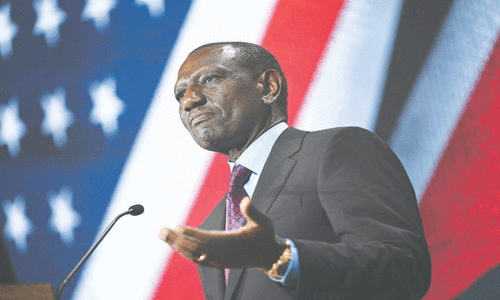STOCKHOLM, June 7: Massive US spending on the ‘war on terror’ pushed global military expenditure above one trillion dollars last year, the sixth successive year the total has risen, a leading research institute said on Tuesday. World military expenditure rose five Per cent to $1.04 trillion, still six per cent below a Cold War peak in 1987-88, but up sharply since 1998, the Stockholm International Peace Research Institute (SIPRI) said in its latest yearbook.
“World military spending...is again approaching its level at the height of the Cold War,” the think tank said.
“The major determinant of the world trend in military expenditure is the change in the United States.”
US military spending accounted for nearly half the global figure, rising 12 per cent last year to $455 billion, the Swedish government-funded institute said.
That was more than the combined total of the 32 next most powerful nations, SIPRI said. The figure was set to rise still further to $502 billion in 2010.
US spending ‘has increased rapidly during the period 2002-2004 as a result of massive budgetary allocations for the “global war on terrorism”, primarily for military operations in Afghanistan and Iraq’, SIPRI said.
By February this year the total amount of extra spending requested for the ‘global war on terrorism’ since Sept 11, 2001, had reached $346 billion, the institute said.
“While US military spending is still lower than during the Cold War in terms of its share of GDP, the sustainability of the current levels is being increasingly questioned,” SIPRI said.
US military spending increased to 3.9 percent of gross domestic product (GDP) last year from three per cent in 1999, but remained well below its Cold War peak of more than six per cent.
The top five countries by military spending — the United States, Britain, France, Japan and China — spent nearly two-thirds of the world total last year, according to the institute, whose database contains officially reported military spending for 159 countries.
Growth in China’s military spending slowed to seven per cent — $35 billion — while Russia’s national defence budget increased almost five per cent to $19 billion, SIPRI said.
Based on data for the past five years, Russia has overtaken the United States as the world’s leading supplier of conventional weapons. Russia, the United States, Britain, France and Germany accounted for 81 per cent of all conventional weapons delivered from 2000 to 2004.
Top military spenders
Rank Country expenditure
(in billions of dollars)
2004 2003
1. United States 455.3 414.4
2. United Kingdom 47.4 51.1
3. France 46.2 45.4
4. Japan 42.4 42.7
5. China 35.4 33.1
6. Germany 33.9 34.8
7. Italy 27.8 27.6
8. Russia 19.4 18.5
9. Saudi Arabia 19.3 18.8
10. South Korea 15.5 14.9
11. India 15.1 12.7
12. Israel 10.7 10.0
13. Canada 10.6 10.0
14. Turkey 10.1 10.3
15. Australia 10.1 9.7
—Reuters













































Dear visitor, the comments section is undergoing an overhaul and will return soon.